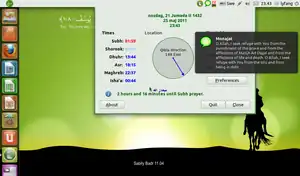 | |
 Sabily Badr 11.04 Unity desktop | |
| OS family | Linux (Unix-like) |
|---|---|
| Source model | Open source |
| Latest release | 11.10 (Uhud) / December 19, 2011 |
| Available in | Multilingual (more than 55)[1] |
| Update method | APT (front-ends available) |
| Package manager | dpkg |
| Platforms | x86 (32 bits) and x86-64 (64 bits)[2] |
| Kernel type | Monolithic (Linux) |
| Default user interface | GNOME |
| License | GNU GPL and others |
| Official website | www |
Sabily (Arabic: سبيلي, IPA: [sæˈbiːliː], My Way) is a discontinued Linux distribution based on Ubuntu, designed by and for Muslims.[3] Originally named Ubuntu Muslim Edition (presented as UbuntuME), development for Sabily was active from 2007 to 2011.
Sabily is designed for Muslim users to have out-of-the-box Arabic language support and Islamic software and tools installed, including a prayer times tool, a Qur'an study tool, a Hijri calendar, etc.
The Unity shell is based on GNOME 3 on Sabily 11.10, Unity 2D for graphic cards without 3D capabilities. The Unity shell became available on the Sabily 11.04 Badr DVD. Ubuntu Classic Desktop was the default desktop in Sabily (11.04), but Unity in Ubuntu 11.04. New applications in Badr: Islamic Date, Zakat Calc, Gufw, DesktopNova, AutoKey, recordMyDesktop, Anki.[4] The full version of Sabily comes with out-of-the-box educational software, codecs for the most used media formats.[3][5] Wisabi is a Sabily 11.04 installer for Windows XP, Windows Vista or Windows 7 based on Wubi.[6]
History
Sabily was previously named as Ubuntu Muslim Edition (UbuntuME). Sabily is following releasing cycle of Ubuntu. After Ubuntu 9.04, It was changed to Sabily.
- UbuntuME 7.04 released 12 October 2007
- UbuntuME 7.10 released 2 December 2007
- UbuntuME 8.04 released 17 May 2008
- UbuntuME 8.04.1 released 22 July 2008
- Sabily 9.04 Taibah released 12 May 2009
- Sabily 9.10 Gaza released 27 December 2009
- Sabily 10.04 Manarat released 28 June 2010
- Sabily 11.04 Badr released 5 May 2011
- Sabily 11.10 Uhud released 19 December 2011
Versions available
There are currently three versions of Sabily, but there is no official host at the moment.
- Small version (967.96 MB), contains the main Sabily packages, including artwork and Islamic applications and Arabic support.
- Full version (1.55 GB), contains the same as the Small version plus multimedia, educational and miscellaneous packages.[7]
- Ultimate version (3.3 GB), has the same content as the Full version, plus Qur'an offline recitations provided by Muhammad Siddeeq al-Minshawi, Huzify, Saad al-Ghamadi and Mishary Rashed Alafasy.
The Ultimate version is useful mainly when not connected to the Internet, yet all Sabily versions provide online Qur'an recitations.
Sabily is available as a Live DVD, which can be booted on the host computer without installation. The Wisabi installer can install Sabily to the hard disk within Microsoft Windows, without involving risky formatting or partitioning.
Additional software
As compared to Ubuntu:
- zekr: Qur'anic Study Tool[8]
- minbar: Islamic prayer times application
- monajat: application that pops up prayers at predetermined times
- Firefox-praytimes: Firefox extension that displays Islamic daily prayer times
- webstrict: UI frontend to DansGuardian (web content filtering tool)
- nanny: the GNOME Nanny parental-control system
- thwab: Electronic Encyclopedia System
- hijra: Islamic calendar
- mus-haf Othman: Othman Qur'an Browser
- noor: Qur'an viewer
- fsool: abbreviated chapters in the Messenger vita
- rejaal: Men around the prophet
Arabic support
- language-pack-ar: translations for language Arabic
- language-pack-gnome-ar: GNOME translations for language Arabic
- mozilla-Firefox-locale-ar: Mozilla Firefox Arabic language/region package
- aspell-ar: Arabic dictionary for aspell
- acon: Text console arabization
- bicon: Console that supports bidirectional text display
- Arab eyes qamoos: Arabic-English dictionary
- fonts-hosny-amiri: Arabic Naskh style typographically oriented font (Amiri is a classical Arabic typeface in Naskh style for typesetting books and other running text)[9][10]
Sabily software
Zekr is an open platform Quran study tool for browsing and researching on the Quran. Recitations and translations are available for download.
Small version DVD available online recitations:
- Abdulbasit Abdussamad (64kbit/s)
- Mishary bin Rashid Al-Afasy (128kbit/s)
- Saad Al-Ghamdi (40kbit/s)
- Mohammed Siddiq Al-Minshawi (16kbit/s)
- Maher Al-Muaiqly (128kbit/s)
- Abu Bakr Ash-Shatri (128kbit/s)
- Saud Al-Shuraim (128kbit/s)
- Abdul Rahman Al-Sudais (192kbit/s)
Minbar indicates the time when Muslims should pray. It runs in background as a tray icon and plays the athan (call to prayer) at prayer times. Minbar works with the main calculation methods, such as Muslim League (default), Shafii, and Hanafi.[11] Muslims observe salat five times a day, and Minbar helps to remind the user of daily prayer times.[12]
 | |
| Developer(s) | Sabily Team |
|---|---|
| Initial release | 2011-09-11 (v2.6.1-3) |
| Operating system | Linux, Windows |
| License | GPLv2 |
| Website | launchpad |
Monajat is an application for Linux and Windows that displays Azkar messages. It runs in the background as a tray icon and displays hadiths. The application is an application provided by the Sabily community.[13]
| Developer(s) | Maui Sabily, Sabily Team |
|---|---|
| Initial release | May 7, 2011 |
| Written in | Gambas |
| Operating system | Linux, Windows |
| Available in | Malay, Indonesian, English, Arabic, Italian |
| License | GPLv3 |
| Website | launchpad |
Zakat Calc is an application for Linux. Zakat, or almsgiving, is one of the Five Pillars of Islam, is the giving of 2.5% of one's possessions (surplus wealth) to charity, generally to the poor and needy. Zakat Calc helps Muslims to calculate zakat types: gold, silver, stones, jewels, savings in bank, property, loans, business, firms, animals (2.5%) and agriculture (10%). It was created using the Gambas programming language and it runs on Linux.
Gnome Nanny (parental control) is an easy way to control how long users or children can be on the computer and what they can and cannot access browsing the web.[14]
See also
References
- ↑ "GNOME Languages". l10n.gnome.org.
- ↑ Sabily downloads
- 1 2 www.sabily.org/website
- ↑ Sabily 11.04 released!
- ↑ Sabily content
- ↑ Wisabi
- ↑ "Sabily content". Archived from the original on 2010-10-06. Retrieved 2010-10-09.
- ↑ William von Hagen (13 May 2010). Ubuntu Linux Bible: Featuring Ubuntu 10.04 LTS. John Wiley & Sons. p. 34. ISBN 978-0-470-88180-4.
- ↑ "Sabily 11.10 released!". Retrieved 11 January 2012.
- ↑ "Debian -- Details of package font-hosny-amiri in sid". Retrieved 11 January 2012.
- ↑ "Debian -- Error". packages.debian.org.
- ↑ "Islamic Prayer Timings". Archived from the original on 2012-04-21. Retrieved 2011-06-12.
- ↑ "Monajat in Launchpad". Launchpad. 7 April 2008.
- ↑ Roberto Majadas; Cesar Garcia; Luis de Bethencourt (11 June 2011). "What is Gnome Nanny?". Retrieved 12 June 2011.
External links
- Sabily at DistroWatch
- sabily blogsphere: Sabily 11.04 Badr Released
- Quick Look: Ubuntu Muslim Edition 10.10 (Sabily Al Quds)
- Sabily 10.04 review from Desktop Linux Reviews
- Sabily 9.04 review from Softpedia
- Sabily 9.04 review from ExtremeTech
- Sabily 9.04 reviewed in LinuxToday Archived 2012-03-09 at the Wayback Machine * Zakat Calc in Launchpad